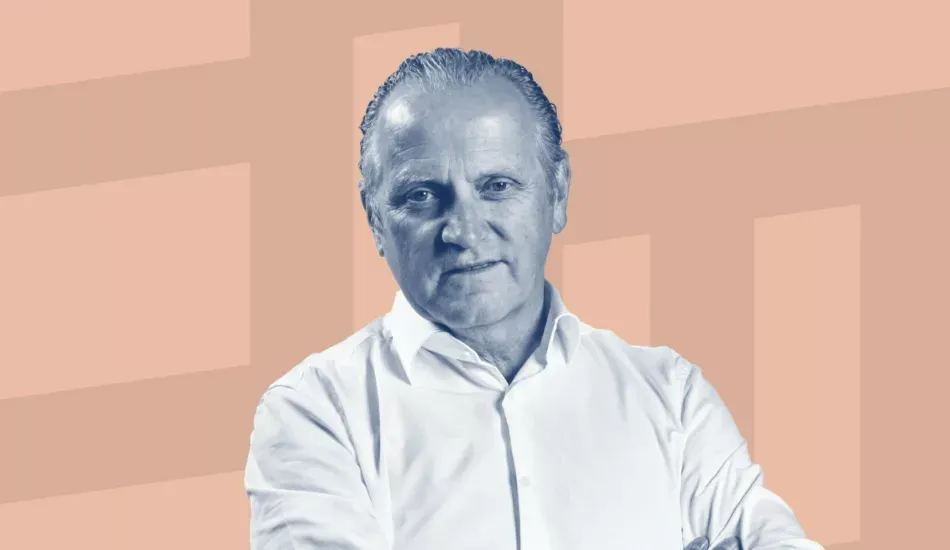Wim de Laat is a fermentation technologist and entrepreneur. With The Protein Brewery he develops and markets vegetable proteins based on fermentation. This saves a lot of animal suffering, land consumption and raw materials. "When I see how we treat animals, I wonder what we're doing."
.
Can you make more of an impact as an entrepreneur than as a microbiologist?
"Definitely. I was previously employed by a large company. Those are driven more by shareholder value than impact. Short-term profits often win out over long-term goals. As an entrepreneur, you can decide what really matters and put your time and energy into that. For me, those are the impactful themes."
How do you make the food chain sustainable?
"It all started with a newspaper article. It described how jungles and forests are cut down to grow soy. Then millions of tons of soy go around the world, including to the port of Rotterdam. It is processed into animal feed, animals eat it, and then we eat the animals again. The current food system is enormously cumbersome and inefficient. That article opened my eyes. I had never thought about it like that before. After reading it, I thought: I will stop eating meat. But I can do more. As a fermentation technologist, I know how to make vegetable proteins. That's where I started then."
In the meantime, the technology is ready and The Protein Brewery is developing proteins based on fermentation in Breda. During the process, sugars from residual streams of carbohydrate-rich crops such as sugar beets, cane sugar, cassava, potatoes and corn are converted into proteins. Specially selected fungal species do the heavy lifting. The proteins grow in a simple but efficient way. Thus much less land and water is involved in production.
Where do you see that you are making a difference?
"The world's population is still growing. If we want to feed everyone while preserving the planet, the food system must be redesigned. That's what I'm working on. I want to produce more food, but in a more sustainable way and without animal suffering. When I see how we treat animals, I wonder what we are doing. Cows that are immediately separated from their calves, pigs that are prepared for slaughter as quickly as possible and roosters that are ground up alive.... It is animal degrading. We need a better alternative, because something doesn't disappear if nothing else takes its place. Fortunately, food producers see this too, and want to include our plant-based proteins in their products."
Have you always believed in your technology?
"Yes. I never doubted it would work. Although it was exciting. What we had come up with was new. But from the beginning we were confident that it would work. Big bumps have been taken, like building the factory. There are buyers, although we want to market our product even better in the commercial market. Fermentation is an expensive technique, so scaling up is important to keep the price down."
The vegetable proteins may now be sold in Singapore and the US. Not yet in the Netherlands. Are strict European laws and regulations getting in the way of your mission?
"Our ingredient has successfully passed the approval process in America and Singapore. There, our product Fermotein is now officially approved, which means it can be used in food and sold freely. In America, however, it still has to receive so-called safety approval from the FDA. This is important for large companies. A Unilever or a Nestlé want that stamp before using an ingredient. For sales in Europe, the procedure is also ongoing, now for four years. It would have been easier if Europe was the first market. Then we would be closer to our customers. Now we call America and Asia a lot, but sooner or later we would have had to. Those locations were already on our agenda. We don't bet on one horse. It is sometimes a bit awkward, but in my opinion I am certainly not held back by European laws and regulations.
The situation now is that we produce in our factory in Breda and sell in Singapore and America. For me, the whole project will not be successful until we have factories on all three continents: America, Asia and Europe. Then you can produce locally and our proteins don't have to go all over the world. We also then have volume, which lowers the cost price and increases the impact. I hope to be there in five to 10 years."
How do you get others to join you in your sustainable mission?
"Internally, it is not so difficult to get people on board. After all, you build the teams yourself. The people who are part of them are already enthusiastic about the product and the underlying mission. You are with like-minded people. It is more difficult to convince investors and potential customers, although it works quite well. I often get people to make time for me and listen to me. Why that is, I don't know. It could be because of my enthusiasm and persuasiveness, but I find it hard to pinpoint. I still find it most difficult to get governments to go along with me, for example when it comes to subsidies. There is an enormous amount involved. The same goes for municipalities and permits. I find that unfortunate and sometimes frustrating, because I believe we have a solution to a major problem. This is the future."
Source: Change Inc